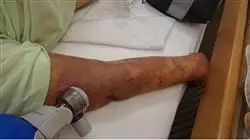University certificate
The world's largest faculty of pharmacy”
Introduction to the Program
With this Postgraduate certificate, you have the opportunity to update your knowledge in a comfortable way and without renouncing the highest scientific standards, to incorporate the latest advances in the approach to infectious pathology in your daily pharmaceutical practice"

Infectious diseases remain the leading cause of death and disability in the world. In 2016, of the total 56.4 million deaths worldwide, 33% were due to infectious diseases, 30% to cardiovascular diseases and 10% to cancer. The fight against disease will have two simultaneous fronts: infectious diseases and chronic non-communicable diseases.
Among the 17.3 million people who died from infections in 2016, the most frequent causes of death were lower respiratory infections (3.7 million), malaria (2.2 million), tuberculosis (1.3 million), diarrhea (1.4 million), and HIV/AIDS infection (1.1 million). The most important factors to consider in relation to infectious diseases are demographics, human behavior, technological and industrial development, economic variations in land use, intercontinental travelling and commerce, climate change, microbiotic adaptation and finally the disappearance or reduction of efficient public health measures.
These factors, interacting with each other, have conditioned that we should not consider any part of the planet reasonably isolated from the rest, nor impossible the appearance, reappearance or dissemination of imported or apparently eradicated infectious diseases in our environment.
The complex international epidemiological situation so far this century, exemplified by the deliberate release of bacillus anthracisspores, the emergence of West Nile virus, the epidemic of severe acute respiratory syndrome (SARS), the zoonotic spread of smallpox, the threat of pandemic influenza, the Ebola epidemic in Africa, the emergence of cases of yellow fever, Dengue and Cholera, the emergence of new arbovirosis in the Americas region, such as Chikingunya and more recently Zika, together with morbidity from other endemic infectious diseases, such as HIV/AIDS, leptospirosis, tuberculosis, pneumonia and the increase in antibiotic resistance with the development of multi-resistant bacteria, highlight the unprecedented need to improve the process of training and development of human capital.
Take advantage of the moment and update yourself in the management of infections from a pharmaceutical point of view"
This Postgraduate certificate in Microbiological and Clinical Diagnosis in Infectious Diseases contains the most complete and up-to-date program on the market. The most important features of the program include:
- Clinical cases presented by experts in Microbiological and Clinical Diagnosis of Infectious Diseases for Pharmacists
- The graphic, schematic, and practical contents with which they are created provide scientific and practical information on the disciplines that are essential for professional practice
- New developments on Microbiological and Clinical Diagnosis of Infectious Diseases for Pharmacists
- Practical exercises where self-assessment can be used to improve learning
- An algorithm-based interactive learning system for decision-making in the clinical situations presented throughout the course
- Theoretical lessons, questions to the expert, debate forums on controversial topics, and individual reflection assignments
- Content that is accessible from any fixed or portable device with an Internet connection
This Postgraduate certificate is the best investment you can make in a program for two reasons: you will obtain a qualification from the largest digital university in the world, TECH, and you will acquire the best and most up-to-date education in Microbiological and Clinical Diagnosis in Infectious Diseases"
Its faculty is made up of prestigious and renowned professionals, with a long history in health care, teaching and research, who have worked in many countries on several continents, developing a professional and teaching experience that they deliver in an extraordinary way in this program.
The methodological design of this program, developed by a multidisciplinary team of e-learning experts, integrates the latest advances in educational technology for the creation of numerous multimedia educational tools that allow the professional, based primarily on the problem-solving method, to face the solution of real problems in their daily clinical practice, which will allow them to progress in the acquisition of knowledge and the development of skills that will impact their future professional work.
It should be noted in this program that all of the contents generated, as well as the videos, self-evaluations, clinical cases and exams have been thoroughly reviewed, updated, and integrated by the teachers and the team of experts that make up the working group, to facilitate the learning process with a step-by-step approach in order to achieve the teaching program objectives.
In this program you will learn about the new viral infections and diseases that subdue the world"

Don't miss the opportunity and get up to date on advances in the treatment of the infections to incorporate them into your daily medical practice"
Why study at TECH?
TECH is the world’s largest online university. With an impressive catalog of more than 14,000 university programs available in 11 languages, it is positioned as a leader in employability, with a 99% job placement rate. In addition, it relies on an enormous faculty of more than 6,000 professors of the highest international renown.

Study at the world's largest online university and guarantee your professional success. The future starts at TECH”
The world’s best online university according to FORBES
The prestigious Forbes magazine, specialized in business and finance, has highlighted TECH as “the world's best online university” This is what they have recently stated in an article in their digital edition in which they echo the success story of this institution, “thanks to the academic offer it provides, the selection of its teaching staff, and an innovative learning method aimed at educating the professionals of the future”
A revolutionary study method, a cutting-edge faculty and a practical focus: the key to TECH's success.
The most complete study plans on the university scene
TECH offers the most complete study plans on the university scene, with syllabuses that cover fundamental concepts and, at the same time, the main scientific advances in their specific scientific areas. In addition, these programs are continuously being updated to guarantee students the academic vanguard and the most in-demand professional skills. In this way, the university's qualifications provide its graduates with a significant advantage to propel their careers to success.
TECH offers the most comprehensive and intensive study plans on the current university scene.
A world-class teaching staff
TECH's teaching staff is made up of more than 6,000 professors with the highest international recognition. Professors, researchers and top executives of multinational companies, including Isaiah Covington, performance coach of the Boston Celtics; Magda Romanska, principal investigator at Harvard MetaLAB; Ignacio Wistumba, chairman of the department of translational molecular pathology at MD Anderson Cancer Center; and D.W. Pine, creative director of TIME magazine, among others.
Internationally renowned experts, specialized in different branches of Health, Technology, Communication and Business, form part of the TECH faculty.
A unique learning method
TECH is the first university to use Relearning in all its programs. It is the best online learning methodology, accredited with international teaching quality certifications, provided by prestigious educational agencies. In addition, this disruptive educational model is complemented with the “Case Method”, thereby setting up a unique online teaching strategy. Innovative teaching resources are also implemented, including detailed videos, infographics and interactive summaries.
TECH combines Relearning and the Case Method in all its university programs to guarantee excellent theoretical and practical learning, studying whenever and wherever you want.
The world's largest online university
TECH is the world’s largest online university. We are the largest educational institution, with the best and widest online educational catalog, one hundred percent online and covering the vast majority of areas of knowledge. We offer a large selection of our own degrees and accredited online undergraduate and postgraduate degrees. In total, more than 14,000 university degrees, in eleven different languages, make us the largest educational largest in the world.
TECH has the world's most extensive catalog of academic and official programs, available in more than 11 languages.
Google Premier Partner
The American technology giant has awarded TECH the Google Google Premier Partner badge. This award, which is only available to 3% of the world's companies, highlights the efficient, flexible and tailored experience that this university provides to students. The recognition as a Google Premier Partner not only accredits the maximum rigor, performance and investment in TECH's digital infrastructures, but also places this university as one of the world's leading technology companies.
Google has positioned TECH in the top 3% of the world's most important technology companies by awarding it its Google Premier Partner badge.
The official online university of the NBA
TECH is the official online university of the NBA. Thanks to our agreement with the biggest league in basketball, we offer our students exclusive university programs, as well as a wide variety of educational resources focused on the business of the league and other areas of the sports industry. Each program is made up of a uniquely designed syllabus and features exceptional guest hosts: professionals with a distinguished sports background who will offer their expertise on the most relevant topics.
TECH has been selected by the NBA, the world's top basketball league, as its official online university.
The top-rated university by its students
Students have positioned TECH as the world's top-rated university on the main review websites, with a highest rating of 4.9 out of 5, obtained from more than 1,000 reviews. These results consolidate TECH as the benchmark university institution at an international level, reflecting the excellence and positive impact of its educational model.” reflecting the excellence and positive impact of its educational model.”
TECH is the world’s top-rated university by its students.
Leaders in employability
TECH has managed to become the leading university in employability. 99% of its students obtain jobs in the academic field they have studied, within one year of completing any of the university's programs. A similar number achieve immediate career enhancement. All this thanks to a study methodology that bases its effectiveness on the acquisition of practical skills, which are absolutely necessary for professional development.
99% of TECH graduates find a job within a year of completing their studies.
Postgraduate Certificate in Microbiological and Clinical Diagnosis in Infectious Diseases
Viruses, bacteria and parasites have been antagonists of human health throughout the years in a war that even today causes great havoc for our species. Malaria, for example, kills 660,000 people annually, many of them young children in sub-Saharan Africa. A detailed knowledge of these pathogens can be the difference between saving a life and adding another figure to the death toll. The Postgraduate Certificate in Microbiological and Clinical Diagnosis in Infectious Diseases is a program developed by TECH Global University that seeks to complement the studies of the Postgraduate Certificate personnel with a high level of knowledge through online. The analytical phases and procedures carried out in a laboratory are key to identify a pathology. This is the direction of this program, which is supported by a teaching staff of renowned curricular standards and an innovative digital learning system.
Specialize in infectious disease diagnosis
We owe the correlation between microorganisms and diseases mainly to two scholars: the physician Robert Koch and the chemist Louis Pasteur. Thanks to their contribution, medicine was able to give birth to vaccines against anthrax, fowl cholera and rabies, as well as antibiotics. And it is also thanks to Koch's and Pasteur's studies that the world today knows microbiology, without which mankind would have been targeted for extinction by pathogens. As a pharmacist, you too can contribute to the continuous development of this scientific branch by studying our Postgraduate Certificate. An accurate clinical diagnosis can be the bridge to discovering, for example, a new type of virus. Within the content explained in the Postgraduate Certificate, you will find everything from studies in virology, bacteriology, genetics and immunology to biosafety and bioterrorism. It was thanks to a clinical microbiological diagnosis that Dr. Ai Fen reported in December 2019 about a new coronavirus that became pandemic: SARS-CoV-2. Hence, this program is the best investment you can make if you want to excel in the healthcare sector.







